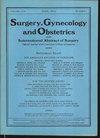Invasive Ductal Carcinoma of the Breast Presenting as Small Bowel Obstruction and Ruptured Appendix: A Rare Case Report and Review
引用次数: 0
Abstract
Introduction: Metastasis of breast carcinomas to the GI tract is uncommon, and when present is usually of the invasive lobular carcinoma subtype. This case report presents an even more unusual example of invasive ductal carcinoma metastasizing to the GI tract, and with the unusual presentation of a ruptured appendix and Small bowel obstruction. Case presentation: This case report describes a 52-year-old female patient who was diagnosed with metastatic invasive ductal breast carcinoma, which had an extremely unusual presentation of severe abdominal pain, nausea, and vomiting and perforation of the appendix and small bowel obstruction. Although tumors themselves are not an uncommon cause of SBO, metastatic breast cancer is extremely uncommon. Suspicion of breast carcinoma was initially considered after CT scan performed for abdominal pain revealed a previously unknown breast nodule. Subsequent worsening of symptoms, caused by rupture of an appendiceal metastasis, required laparotomy revealed mass of the appendix. Conclusion: This case report and review highlights that it is essential to keep an open mind regarding nonspecific symptoms, and always consider unusual presentations. Early diagnosis from appropriate and timely workup results in better patient outcomes and reduces morbidity and mortality. Invasive Ductal carcinomas of the breast very rarely metastasize to the GI tract, Invasive lobular carcinomas more commonly metastasize to the GI tract whereas invasive Ductal carcinoma metastasizes to lungs and liver. Throughout 23 years reviewing about 8699 appendectomy specimens only about 15 cases of secondary appendiceal tumors were identified.以小肠梗阻及阑尾破裂为表现的乳腺浸润性导管癌一例罕见病例报告及回顾
简介:乳腺癌转移到胃肠道是罕见的,当存在通常是浸润性小叶癌亚型。本病例报告提出了一个更不寻常的侵袭性导管癌转移到胃肠道的例子,并伴有不寻常的阑尾破裂和小肠梗阻。病例描述:本病例报告描述了一名52岁的女性患者,她被诊断为转移性浸润性导管性乳腺癌,其表现非常不寻常,包括严重腹痛、恶心、呕吐、阑尾穿孔和小肠梗阻。虽然肿瘤本身并不是导致SBO的罕见原因,但转移性乳腺癌却极为罕见。在腹部疼痛的CT扫描显示先前未知的乳房结节后,最初考虑怀疑乳腺癌。由于阑尾转移破裂导致症状恶化,需要剖腹手术,发现阑尾肿块。结论:本病例报告和回顾强调了对非特异性症状保持开放心态的重要性,并始终考虑不寻常的表现。通过适当和及时的检查进行早期诊断可改善患者预后并降低发病率和死亡率。乳腺浸润性导管癌很少转移到胃肠道,浸润性小叶癌更常转移到胃肠道,而浸润性导管癌转移到肺部和肝脏。23年来回顾了8699例阑尾切除术标本,仅发现了15例继发性阑尾肿瘤。
本文章由计算机程序翻译,如有差异,请以英文原文为准。
求助全文
约1分钟内获得全文
求助全文

 求助内容:
求助内容: 应助结果提醒方式:
应助结果提醒方式:


